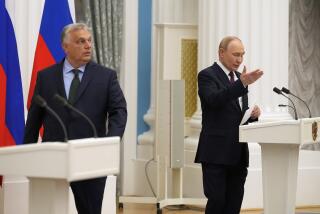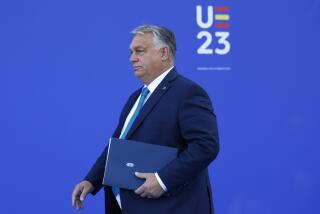Parliamentary Debate Reflects Soviet Turmoil
- Share via
MOSCOW — The tidy debates that the Soviet Union’s national Parliament, the Supreme Soviet, has held for decades to approve whatever the country’s leaders put before it began Wednesday to reflect the tremendous political turmoil through which the country is passing.
Amid platitudes on the infallibility of the Communist Party, the brilliance of its leaders and the shining future, there was suddenly criticism of government proposals for restructuring the political system from deputies--themselves party members--who found serious fault with some provisions.
Some said they believed that a number of points had not been well thought out and that the action was hasty. Others felt that the basic proposals were good but offered amendments to correct an oversight--or cater to a special interest.
And there were fireworks: The president of the Soviet Baltic republic of Estonia rebutted, point by point, criticism from Soviet President Mikhail S. Gorbachev and found himself under attack by others. The president of Armenia, another of the Soviet Union’s constituent republics, accused the president of neighboring Azerbaijan of political immaturity and callousness.
Suddenly, there were politics at the Supreme Soviet, whose semiannual, two-day sessions had long defined tedium and hypocrisy, even for the 1,500 deputies whose sole function had been, as Gorbachev himself put it Tuesday, “to approve what had been decided elsewhere.”
“ Perestroika (Gorbachev’s restructuring plan) has awakened society from its apathy,” declared Kiril Lavrov, a prominent actor, jerking his fellow deputies out of their accustomed reverie with a booming voice that caused some to raise their hands, thinking they were being asked to vote. “The people are alive as never before--how can we continue to sleep?”
Today, the deputies are expected to approve, as they always have, the legislation before them: constitutional amendments that restructure the Soviet political system and an electoral law that encourages contested elections. At the same time, they are set to give Gorbachev the mandate he wants to accelerate perestroika .
In effect, they are being asked to vote themselves out of existence--and, ever loyal to the party, they undoubtedly will.
But the vote probably will not be unanimous; that tradition was broken in October. And some political wheeling and dealing may be necessary to avoid embarrassing mass abstentions or “no” votes from republics where resurgent nationalism is challenging the central government.
Still, the brief debate has given the Soviet Union an idea of what politics will become under the new constitutional system, which Gorbachev sees as the country’s most fundamental reform, one that will allow him to proceed with much faster changes.
The constitutional amendments provide for a large tricameral Congress of the People’s Deputies, whose 2,250 members will meet twice a year, and a much smaller standing legislature, the Supreme Soviet, whose 450 members will have broad lawmaking authority. At the head of the Supreme Soviet will be an executive president, expected to be Gorbachev, who will have vast powers.
Lavrov suggested that the first order of business of the new Supreme Soviet should be a renovation of the Kremlin hall where it meets.
“I am looking at this hall, a beautiful hall,” he said. “We have been sitting here as deputies for five years. . . . But it is a legacy of the past and should be consigned to the past.
“We have headphones so we can hear, but no microphones so we can speak. This hall is suited for unanimity, and it should be rebuilt for heated debates.”
No one disputed that, for such is the traditional placidity of parliamentary debate here. Instead, the deputies returned to their conversations, their mid-morning naps and the reading of newspapers and magazines.
Arnold Ruutel, the Estonian president, quickly got the deputies’ attention Wednesday with a defense of his republic’s controversial constitutional amendments, since ruled invalid by the Presidium of the Supreme Soviet. He explained why Estonia had wanted to declare its “sovereignty” within the Soviet Union and what right it claimed to veto national laws on its territory.
Criticizing the proposed changes point by point, Ruutel commented, “There is nothing surprising in the fact that we have found our own vision to help us with our economic problems.” Since Estonia’s forced incorporation into the Soviet Union in 1940, the national leadership had done little for the republic’s development.
“When the draft laws were published, we began a lively debate in Estonia,” Ruutel said. “Many people thought they would infringe on the rights of the republic. . . . We acted democratically, legally and, we believe, constitutionally.”
His points were promptly and hotly disputed by other deputies, one a farmer from the middle reaches of the Volga River and another a Russian construction foreman. But what surprised many was his boldness in contradicting Gorbachev, who was sitting directly behind him as he spoke.
“You see him standing there, you hear what he is saying, and you naturally expect a bolt of lightning to strike him--and yet he remains and is applauded strongly for his courage, if not necessarily his ideas,” said a senior Soviet journalist, who has learned in years of covering national politics what is permissible and what is not.
The presidents of Latvia and Lithuania, the other Baltic republics, had challenged the Gorbachev line earlier, but less boldly.
The hottest debate came, in the end, between the presidents of Armenia and Azerbaijan, two republics in the southern Soviet Union that have been torn by communal violence for nearly 10 months.
“If the people of Azerbaijan had shown political maturity and civic wisdom, they would have condemned those events in Sumgait as a crime against another nation,” Armenian President Grant Voskanyan declared, referring to the killing by Azerbaijanis of at least 26 Armenians last February.
“Then there would not have been events like those in Kirovabad and Nakhichevan,” he added, referring this time to new anti-Armenian riots in two other Azerbaijani cities.
Then, in an extraordinary attack on Azerbaijani President Suleiman Tatliev, Voskanyan accused Tatliev personally of ignoring Gorbachev’s calls for a peaceful resolution of the conflict and of trying to blame the renewed violence on Armenians.
“I am at a total loss at such incorrect accusations towards a neighboring republic,” Voskanyan said. “It is evident that Tatliev did not draw any conclusions (from Gorbachev’s appeal) and that he is categorically rejecting any compromise.”
More to Read
Sign up for Essential California
The most important California stories and recommendations in your inbox every morning.
You may occasionally receive promotional content from the Los Angeles Times.













